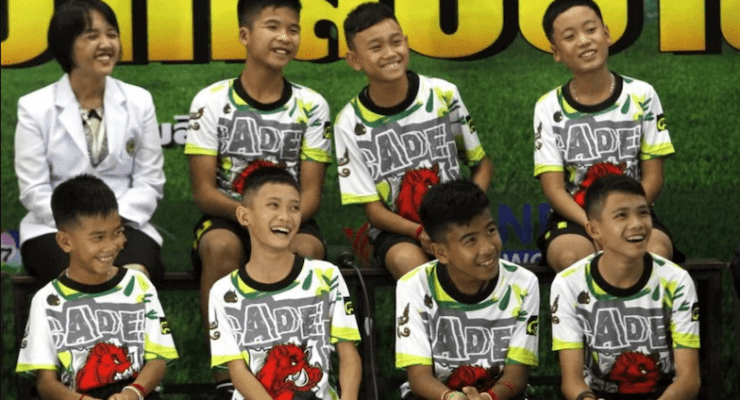
As 12 young soccer players and their coach readjust to life above ground following their miraculous escape from a flooded cave, the Thai government has floated a novel way for them to evade the media hounds lingering in search of precious details: become monks.
After more than two weeks trapped underground, followed by a week of reunions and recovery in hospital, the 13 would be well served by the peace and privacy of life in a Buddhist temple, even if just for a month, the Public Health Ministry announced.
“As a Buddhist monk, you have a chance to cleanse your spirit and mind,” Nopparat Kanthawong, head coach at the Wild Boars soccer club, said on Sunday evening, humouring reporters with remarkable patience as his chances of seeing the start of the World Cup final ticked away.
“The monastery would keep the boys hidden from all unnecessary distractions.”
[On the ground amid the Thai cave media frenzy]
After the 12 boys — aged 11 to 16 — and their assistant coach went missing on July 23, a media mini-city built up here in Mae Sai, with many hundreds of reporters eager to present the story to a world fixated on their fate.
What turned out to be one of the biggest news stories of the year climaxed when the full team emerged from the caves alive on June 10. And while the World Cup and Trump’s dalliance with the Queen subsequently stole top billing on the news agenda, the “Cave Boys’” being discharged from hospital on Wednesday put them back on top.
Anticipating this, the Thai government last week disseminated a set of guidelines for media, and for the families of the 13, to follow — with the central point being that the boys be given a month to readapt to regular life before they are bombarded by the press.
In a monastery, of which there are plenty in Mae Sai, they would be afforded relative anonymity. Everyone wears the same robes; everyone has the same shaved head; and any reporters would, or at least should, go through the Abbot, or chief monk, to speak with any novice under his care.
“The press would not be able to just charge in asking questions of the boys,” a monk of more than 40 years told Crikey. “And if they don’t have the dreaded media hounding them,” he added, with half a grin but completely serious, “they might be able to recover more quickly.”
(The monk was part of the traditional Buddhist ceremony to cleanse the cave site of bad karma on Monday and asked to remain anonymous.)
In a government announcement last week, a registered psychologist warned that sudden and intense exposure to the media could trigger post-traumatic stress disorder in the boys and the coach.
On Wednesday, the 13 were presented to the media in a press conference heavily managed by authorities, with military doctors flanking the boys and questions pre-approved by government psychiatrists. An ongoing amnesty from the media, however, seems unlikely — at least on current form.
Thai media reported on Saturday that a foreign journalist had disguised himself as a patient and made it into the boys’ hospital ward, before being unmasked and kicked out. Parents have complained about excessive — and at times intrusive — attention, including hidden cameras forced into the place they stayed during the ordeal. And a Polish reporter was arrested for flying a drone over the cave site during the rescue, despite clear warnings from the chief of the mission that such information-gathering techniques were illegal.
The guidelines present a new dilemma for the media still assembled in Chiang Rai, with editors at desks faraway starting to count the financial cost of covering the story. While discussing this on Sunday, a reporter for one of the world’s biggest media outlets joked that his efforts would be scaled back to “polite stalking”.
In a press release, the government instructed media to not “create drama”, “place blame” or “use opinion” in their reporting. It also warned the soccer players and their families against engaging with social media.
Yet while the boys’ welfare is presented front and centre in official rhetoric, it may not be the sole reason to control and manage the narrative around the “Cave Boys”.
Amid swelling discontent with an increasingly authoritarian military government — which took power by coup in 2014 and has been delaying a promised election ever since — the story has for more than three weeks dominated discourse, led news bulletins, and taken up entire front pages.
The story has also allowed Prime Minister Prayuth Chan-ocha to present himself and his state apparatus as saviours. Indeed, the prime minister flew to Chiang Rai to visit some of the boys in hospital even before the families were granted access.
“It’s a great opportunity,” the anonymous monk said of the saga. “They will be doing their best to get full value out of it.”








Crikey is committed to hosting lively discussions. Help us keep the conversation useful, interesting and welcoming. We aim to publish comments quickly in the interest of promoting robust conversation, but we’re a small team and we deploy filters to protect against legal risk. Occasionally your comment may be held up while we review, but we’re working as fast as we can to keep the conversation rolling.
The Crikey comment section is members-only content. Please subscribe to leave a comment.
The Crikey comment section is members-only content. Please login to leave a comment.